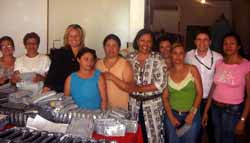Business fellowship to Brazil yields more than profits
 Photo courtesy Nicole DeSilvis
Nicole DeSilvis (pictured third from the left) helped foster trade between this Brazilian company of artisans and small businesses in the U.S. These women make macramé purses out of soda can tabs.
|
According to Nicole DeSilvis, sometimes business is about more than net profits and the bottom line. “We have the power to better people’s lives through business,” she said. And that’s exactly what DeSilvis, an international trade consultant at the Temple Small Business Development Center (SBDC) and adjunct professor of international business, worked to accomplish this summer. |
|
On July 12, DeSilvis traveled to Brazil to complete a fellowship that was part of an exchange program between the Small Business Administration (SBA) and SEBRAE, a Brazilian agency that supports the development of small-sized business activity. Robert L. Elsas, the regional manager and senior international credit officer of the U.S. Small Business Administration, recommended DeSilvis for the fellowship. He chose her for her knowledge of international trade and her outgoing personality. DeSilvis’ main objective was to conduct a needs assessment of SEBRAE’s (the Brazilian Small Business Agency) clients for export potential and of the organization itself. She recommended several market strategies for their clients and some restructuring ideas for the organization. These final recommendations were discussed with SEBRAE, USAID and the U.S. ambassador to Brazil, Hon. Clifford Sobel. Her mission was also to facilitate an exchange between the U.S. Small Business Administration and SEBRAE, particularly between companies in Pennsylvania and Brazil. Because of DeSilvis’ work, SEBRAE and USAID now want the SBA to return to Brazil and train SEBRAE. “Many companies in Brazil create high-quality products and want to sell their products abroad, but one piece of the puzzle is missing: market intelligence needed to sell these items in other countries. Helping the companies understand the wants and needs of other countries is the puzzle piece that I was able to supply,” DeSilvis said. Using her expertise in international and small businesses, DeSilvis met with several companies, surveyed their export potential, and assisted in alternative market entry strategies. She worked to create mutually beneficial links between the two countries. One of the companies she visited trains and employs impoverished women to make macramé purses out of soda can tabs. By introducing marketing strategies to this business, she not only helped the economy but hopes also to have changed people’s lives. “These women used to carry bricks for 50 cents a day. These companies I worked with are teaching them how to how to plan for their futures and develop marketable skills. Now they can take pride in their job and provide for their families,” DeSilvis said. DeSilvis’ mission included assessing the company’s overall strategy and creating a new one, which will help increase their export potential. This plan also included restructuring their training programs, which will potentially increase the number of women benefiting from this project and contribute to the economic development of the country. While in Brazil, DeSilvis learned firsthand about how many Brazilian companies work and how they operate differently than they would in the United States. For example, she discovered that in Cabo Frio, a city in the state of Rio, groups of companies work together in clusters to achieve similar goals, such as completing a large order to keep up with demand and remain competitive. “You never truly know a country until you immerse yourself in it,” DeSilvis said. “Even though I will never fully understand because I will always be a foreigner in the country, this fellowship allowed me to be privy to many of the inside workings. Now I have this knowledge I can share with my companies and students.” DeSilvis, who teaches the undergraduate “International Business Capstone Practicum,” plans on incorporating the skills she developed in Brazil into her classroom. “As a professor, you can never let your teaching become stagnant. This fellowship rejuvenated my interest in international business, and the class will only become better as a result,” she said. DeSilvis also launched the Temple SBDC’s International Business Trade Program in 2002, which helps more than 100 local area companies per year achieve their export potentials. In April, DeSilvis received the Philadelphia Business Journal’s “40 Under 40” award. Despite the accolades, DeSilvis remains humble. She insists that her success is a direct result of working with other talented faculty members and teaching intelligent, ambitious students. “I am very fortunate to have had this opportunity. Going to Brazil was truly an eye-opening and life-changing experience for me. I have a new sense of why I do what I do, and I have the Fox School to thank for that,” she said. — By Holly Otterbein |
|